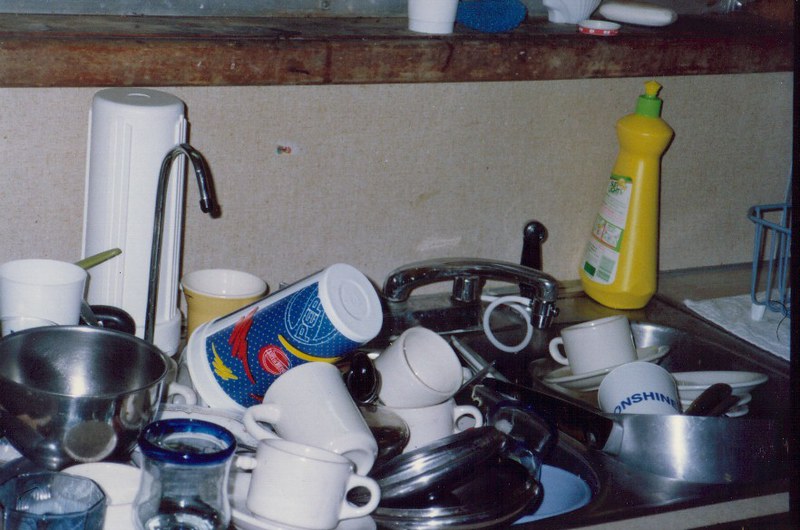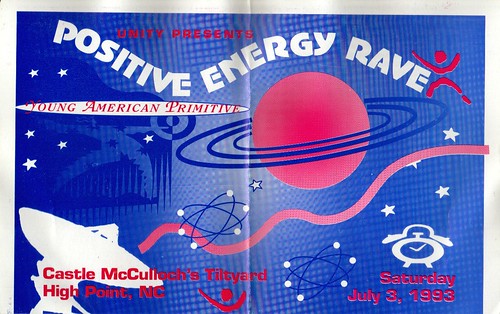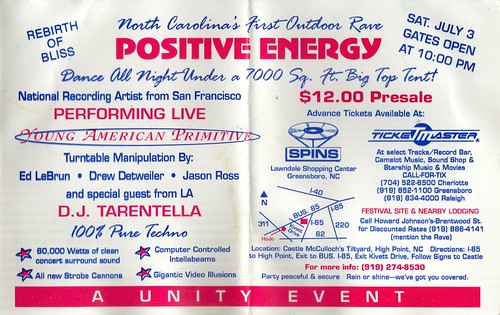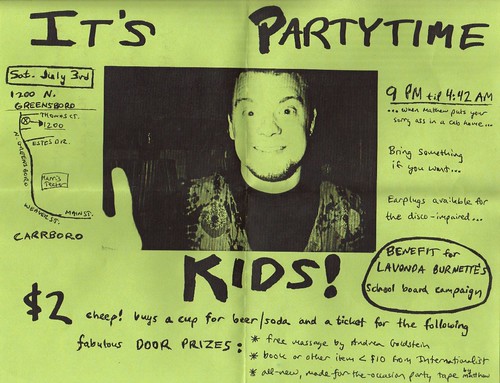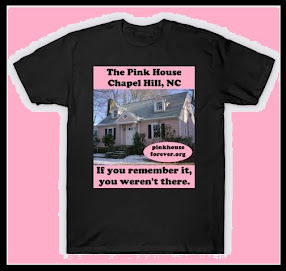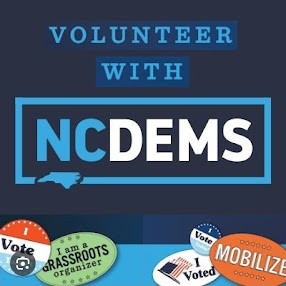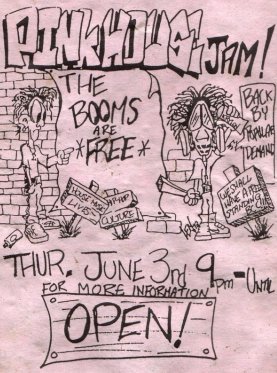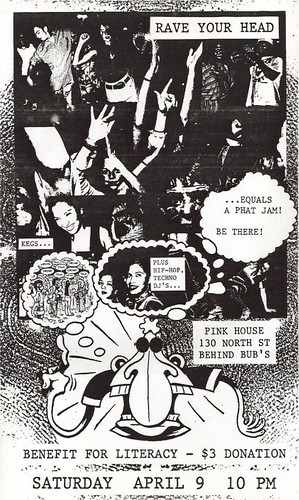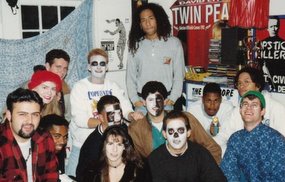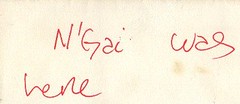Tsunami: Band Interview
To speak of Washington, DC-based indie rockers Tsunami is to speak of Simple Machines, the record label founded in by Jenny Toomey and Kristin Thomson. With an appreciation of pop aesthetics, Dischord ethics and fun packaging, Simple Machines has helped the D.C. music scene broaden its definition of punk. Spreading the DIY (do-it-yourself) doctrine, Simple Machines has also pioneered a how-to-release-your-own-record booklet to encourage others to do it their way.
After loads of noteworthy singles, the label recently released CD#2, which, happily enough, belongs to Tsunami. Deep End, the band's first full-length, came out early this summer and they've been on the road ever since. In July (7/26), the tour bus (actually a van) stopped at Local 506 to indulge for a criminally sparse audience.
Tsunami = Kristin Thomson (guit/vox); Jenny Toomey (guit/vox); John Pamer (drums); and Andrew Webster (bass/vox). Stay Free!'s chat with the band, which took place after the show but prior to an alleged mugging across the street, was conducted by Chris Palmatier, Carrie McLaren and Jay Murray.
SF!: How did each of you get involved with music? Like how'd you all get interested in playing and the indie-rock thing?
AW: Fun roommates and a wet-behind-the-ears tour.
SF!: So it was post-high school?
AW: Yeah. I didn't care about rock in high school.
JP: I did. I had a Moving Targets sticker on my car.
Kris: I was really interested in setting up shows in college. I totally fell into it like that, instead of playing, although I played instruments all the time.
SF!: Were you listening to music outside mainstream channels?
Kris: Yeah totally. I used to go to punk rock shows all the time. Then I just got more involved in setting them up. Once you get involved not just as a spectator but as a participant, it's much easier to participate in other ways. Whether it's playing or putting out records or whatever.
Jen: I was always into music, before I knew about punk at all. I was in choir s and stuff, and really into Simon and Garfunkel and the Dead. When I found out there were kids in my high school who were putting out their own records, that was the coolest thing. Incredible. That's how I started being involved with punk in the first place. And then I did similar things like Kristen, put shows on, stuff like that, and eventually decided to play.
SF!: So playing followed the other stuff?
Jen: Well there was punk and then feminism in college, and then I thought about why, since I'd been really into music, I hadn't stepped up to be in a band. And I had other friends who asked me that question. So the next thing was the band.
SF!: I recently had this meeting at my house with local women rockers and there was one woman who was visiting from Washington. She was surprised to hear that the number of women involved in our music scene hasn't increased much proportionately because she said there were a lot more women in the D.C. scene. I was wondering if you guys noticed anything like that yourselves and if you would attribute it to anything. Or traveling around if you've noticed differences in the number of women in your audiences.
JP: I've definitely noticed a difference since we've been traveling, but in D.C. I don't know. I've only been listening to music there since like '86. Everywhere else there seems to be more women in bands.
Jen: On the last tour, there were definitely more women in the audience, probably because we were identified with riot grrrls. We had mainly all-women or mostly women bands opening for us, which was really unusual. The same thing happened in D.C. When Fire Party, a Dischord band that was all women, first started playing, a bunch of women who had been part of the scene suddenly got in bands because all of a sudden there was someone else doing it. I think you always need someone to step up front and do it first and make it formal.
AW: So you don't feel like the first freak.
Jen: There were other girls in bands, but Fire Party were the first that were enough a part of the scene that people thought they were cool to be in a band. Then it became sort of a role model thing. My whole theory is that in small scenes, there's a lot more place for women in the bands because the people who are alternative, or weird, or freaks, are so few that they need as many people as they can get. So, if there's girls...(everybody laughs)
AW: It doesn't pay to cut the girls out.
Jen: Exactly. So in weird cities, like those in Louisiana, there are punk rock bands with girls because there's not enough punks to divide themselves into traditional lines.
SF!: So you might have gotten involved more quickly if you hadn't been in D.C.?
Jen: Maybe. I needed someone I respected to ask me why I wasn't in a band before I joined one.
AW: I came from a really small, non-musical, non-punk scene in Connecticut, and there are no girls in bands there still. They could do to include the other half of the population, but there hasn't been anyone bold enough to step up and do it first. So they're still all-boy bands, and they're punk or they're indie rock.
SF!: Is there a reason to make a conscious effort to play with girl bands? A lot of women in bands don't like being tagged as women bands, or riot grrrls...
Kris: To some extent it's silly being categorized; all this stuff is so short term anyway.
Jen: I think we're all really interested in girl bands. When we know there's a girl in the opening band, we'll probably watch them longer.
AW: [Laughing] Yeah, it's much more exciting. Tomorrow night, Columbia, South Carolina: all I know is that the band that's opening for us has a girl singer and a girl guitar player. And I'm already more interested. Just by being a girl bold enough to step into a boy rock world, you're probably more interesting than Joe Normal Guy who just got in because all his friends were in. Any boy can be in a band, but it's sort of a sassy, spunky girl to jump into the scene.
SF!: Logistical questions: which came first, band or record label?
Jen: Record label, a year before the band.
SF!: Was that just an outgrowth of putting together shows?
Jen: Well, I was in other bands, besides Tsunami, and we had stuff that we'd recorded, and no one else was going to put it out, so we started the record label.
SF!: So you were in Geek (a pre-Tsunami band) before Simple Machines existed?
Jen: Yup, definitely.
SF!: Does Simple Machines have a goal?
Kris: We're just trying to put out records that we like, that are mostly our friends' bands, and sell 'em for a fair price. Up until now we've done mostly compilations, so we've worked with about a hundred bands now. We try to think of interesting projects and tie them up with themes or community awareness. We're into giving people information and ways to get more information.
SF!: When you made the jump from putting out 7-inches to CDs with the Mommyheads CD, was that a huge jump?
Jen: Not really. Kris and I have a lot more work...think our main goals are to set it up as a label that doesn't make the mistakes that a lot of labels do in this weird period where you end up overextending yourself, getting into debt, and then taking advantage of people. It's very hard because there's not a very high profit margin on 7 inches or even little CDs. The Mommyheads CD never recouped its costs. It's very hard to keep things in print; the amount of work is so big, we have friends who help us, but we pay them a pittance. The question is how to raise their salaries and keep the label going, to set it up so it's really a business that actually pays people a living, while being creative.
SF!: Are your goals for the band and the label at all on different scales? I mean, it seems like everyone in the band is sort of involved in the label. Is there any time that there's a conflict between those two priorities?
Kris: No. We plan both things together. If Tsunami has to go on tour, we figure out what's best for Simple Machines releases when we start. We rely a lot on friends who keep things going...
SF!: I know earlier you said you were trying not to make the mistakes other labels made. Has it helped to learn from Superchunk and the Merge folks? Having somebody kind of one step ahead?
Jen: We're totally the luckiest label for that kind of stuff. We watched Dischord and Sub Pop, and Slumberland to try to avoid problems they ran into. And we all help each other, if there's somebody who's not trustworthy, we let everybody know not to deal with them.
SF!: Do you guys hear a lot about people who used your how-to-release-a-record thing?
Kris: Totally. We get tapes and records every day. There's been over 800 booklets sold.
Jen: I think the whole packaging thing has totally blossomed in the last few years. People take a real interest in making releases look beautiful.
SF!: Have you guys gotten big offers?
Jen: Never. I don't think a major has talked to us directly, ever. Some major independents...
AW: We got a form letter from MCA.
Jen: They heard about the show tonight. They heard how bad it was gonna be.
SF!: Does the lack of hype make your life easier?
Jen: We have hype...I don't know. Mudhoney never got approached by a major label until they went looking, because they made it really clear that they weren't interested. So maybe that's it. Or maybe we're just really pathetic.
SF!: Well, you guys are kind of successful with your own thing.
AW: When there's a major guy, he comes up to you, "I know you do it all great yourself, but we could do better."
Jen: Well, it's funny to listen to those people go into dumb bandspeak, like "We could give you some tour support."
AW: "There's a lot of exposure on the national level for your act."
Jen: I think everybody should put out their own records first, so they know what all that stuff means.
SF!: Do you guys use contracts?
Jen: Yeah, we do.
SF!: For 7 inches?
Jen: Not for the 7 inches but for Scrawl, and Tsunami is on contract to Simple Machines.
SF!: Do you guys all pay yourselves through your band thing? Or do you have day jobs?
Jen: We used to have jobs, but we just quit them recently to tour.
AW: Six weeks on, six weeks off...
SF!: How do you get the Working Holiday series organized? (Working Holiday is a 12-part series of 7" split singles, one for every month in 1993. Each single is thematically related to a holiday within the month of its release.)
Jen: We just sat down and did a wish list and almost every one came through. We figured it out all ahead of time and got 24 bands up front. Then one alternate band wrote a song that we could stick in when the first fuck-up band didn't get us stuff on time, which happened with the third single.
SF!: My favorite is the Cocktails song...soooo hot!!
Jen: That's the one!
Kris: That was the alternate we used. (Liz Phair was the fuck-up).
